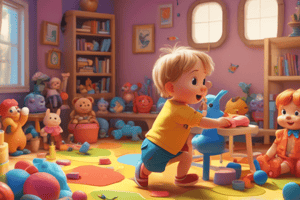Podcast
Questions and Answers
What stage involves purposeful exploration of toys via trial and error?
What stage involves purposeful exploration of toys via trial and error?
- Stage II: 13-17 months (correct)
- Stage I: 9-12 months
- Stage III: 17-19 months
- Stage IV: 19-22 months
What type of play is exhibited in Stage III: 17-19 months?
What type of play is exhibited in Stage III: 17-19 months?
Autosymbolic play
In Stage VI, children can fully respond to WH questions inappropriately.
In Stage VI, children can fully respond to WH questions inappropriately.
False (B)
At what stage do children begin to use possessives such as 'my' and 'mine'?
At what stage do children begin to use possessives such as 'my' and 'mine'?
What stage involves a child re-presents daily experiences in play?
What stage involves a child re-presents daily experiences in play?
Match the following stages with their key characteristics:
Match the following stages with their key characteristics:
What is the primary focus of play in Stage IX?
What is the primary focus of play in Stage IX?
Children primarily engage in parallel play in Stage VIII.
Children primarily engage in parallel play in Stage VIII.
What linguistic features emerge by Stage X?
What linguistic features emerge by Stage X?
Flashcards are hidden until you start studying
Study Notes
Stages of Play Development
-
Stage I (9-12 months):
- Engages in goal-directed play, exploring ways to obtain desired objects.
- Begins to understand simple cause and effect through actions like finding toys hidden under fabrics.
- Demonstrates early language skills with performance words and communication that involves requests and commands.
-
Stage II (13-17 months):
- Engages in purposeful exploration and trial-and-error play with toys.
- Shows awareness of others' capabilities by handing toys to adults for assistance.
- Uses context-dependent single words and demonstrates a fluctuating vocabulary; initiates requests and interactions with gestures.
-
Stage III (17-19 months):
- Engages in autosymbolic play, such as pretending to eat or sleep.
- Demonstrates functional language development with nine types of language uses including recurrence, existence, and action.
- Vocabulary expands rapidly, although does not refer to absent situations.
-
Stage IV (19-22 months):
- Engages in symbolic play beyond self, such as caring for dolls and combining two toys in play scenarios.
- Begins using possessives but lacks word endings; references absent objects signifies cognitive growth.
-
Stage V (24 months):
- Engages in role-play that reflects daily experiences using realistic objects; limited to short event sequences.
- Engages in block play and consumes sand/water play; language reflects earlier functions, now extending to phrases, questions, and word endings.
-
Stage VI (2.5 years):
- Represents less common events through play, such as medical scenarios; parallel play is more evident.
- Responds to WH questions contextually, begins to ask questions though responses may not be accurate.
-
Stage VII (3 years):
- Connects pretend play in sequences; demonstrates use of past and future tense as a reflection of cognitive progress.
- Engages in unplanned sequences and revisits old play scenarios with new outcomes.
-
Stage VIII (3 to 3.5 years):
- Utilizes less realistic props, signaling development in perspective-taking (theory of mind).
- Increases use of descriptive language and begins to give dialogue and perspectives to inanimate objects.
-
Stage IX (3.5 to 4 years):
- Starts hypothesizing and planning for hypothetical scenarios; uses dolls and puppets for narrative scenes.
- Develops reasoning skills, articulating intentions and demonstrating problem-solving.
-
Stage X (5 years):
- Plans elaborate sequences of pretend play, coordinating roles and events without needing realistic props.
- Exhibits advanced language skills with relative and subordinate clauses, though full mastery develops later.
Studying That Suits You
Use AI to generate personalized quizzes and flashcards to suit your learning preferences.




